Dealing with sibling rivalry during summer can be tough, but you can tackle it. Start by promoting open communication and teaching conflict resolution skills. Schedule structured routines and encourage teamwork through fun activities. Make sure to provide individual attention to each child, helping them express their feelings. Use shared experiences to enhance emotional intelligence and reinforce positive behavior. There’s plenty more you can do to manage rivalry effectively, so keep exploring strategies!
Key Takeaways
- Promote open dialogue to help siblings express their feelings and concerns without judgment.
- Schedule regular collaborative activities to foster teamwork and encourage positive interactions.
- Teach conflict resolution skills to empower children to handle disputes independently.
- Model emotional regulation by demonstrating healthy responses during conflicts.
- Create a structured summer routine that includes family bonding time and individual interests.
Understanding the Causes of Sibling Rivalry in Summer
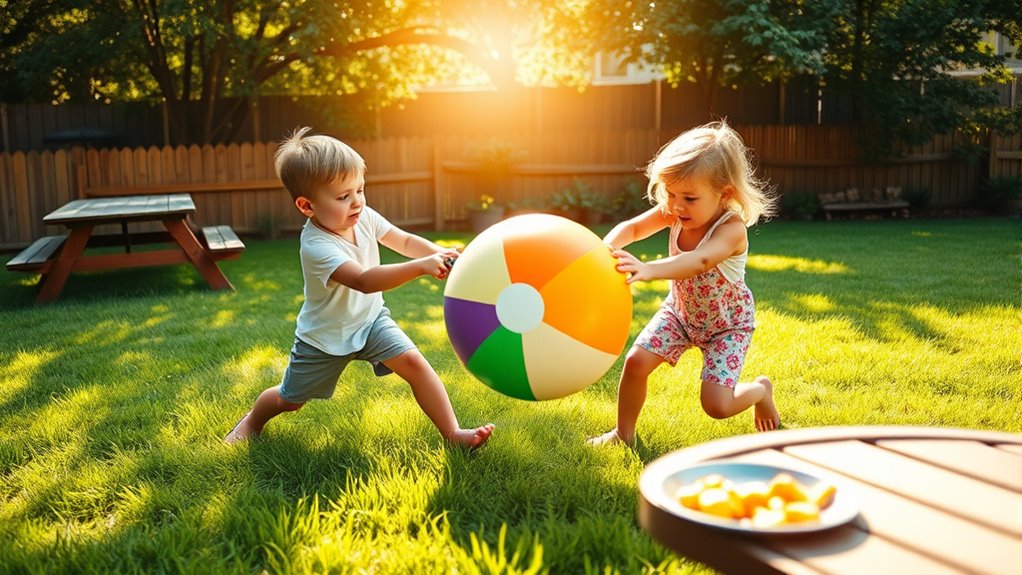
Understanding the causes of sibling rivalry during summer can help you manage conflicts more effectively. During this season, your children spend more time together, which can heighten competition for your attention and affection.
Factors like age and birth order play a significant role, especially if they’re close in age. Jealousy often creeps in when one sibling feels favored or overlooked. Different developmental stages can also complicate interactions, making it tough for siblings to engage in shared activities.
Family dynamics, such as stress or marital conflict, can further exacerbate these rivalries. Being aware of these triggers allows you to address the underlying issues, fostering a more harmonious environment for your kids throughout the summer months.
Managing Conflict During Extended Time Together
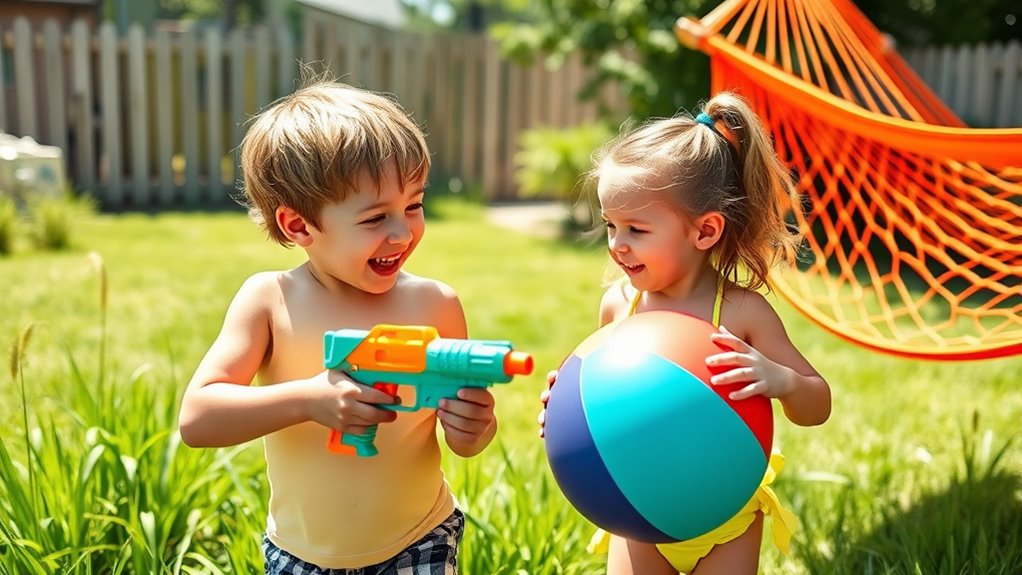
While summer brings opportunities for fun, it can also lead to increased sibling conflicts when kids spend extended time together.
To manage these conflicts, promote open dialogue by encouraging your children to express their feelings. Teach them conflict resolution skills so they can calmly approach problems and find solutions together.
Encourage open dialogue and teach conflict resolution skills to help siblings express feelings and find solutions together.
Model positive communication by demonstrating respectful interactions, and use calming phrases to ease tensions. Avoid taking sides during disputes to guarantee both siblings feel heard.
Additionally, schedule special playtime and assign collaborative tasks to foster teamwork. By encouraging empathy and gratitude, you’ll help them understand each other better, paving the way for stronger bonds and smoother summer days. Recognizing patterns of emotional detachment in sibling relationships can also help parents address underlying issues effectively.
Creating a Structured Summer Routine
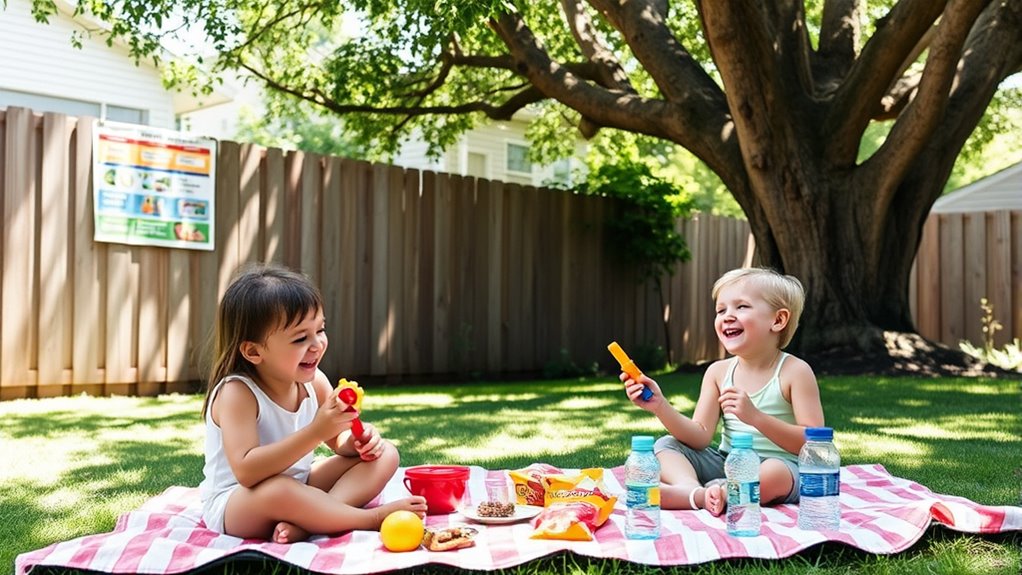
Creating a structured summer routine can transform the long days into a balanced mix of fun and productivity. Start by maintaining consistent sleep schedules to provide stability for your kids. Incorporate educational activities like reading or museum visits to keep their minds engaged. Scheduling age-appropriate chores teaches responsibility while allowing time for relaxation and free play to prevent burnout. Engaging in family activities fosters bonding and creates lasting memories. Set flexible goals to allow for spontaneity within your plan. Involve your kids in crafting the summer schedule, ensuring their interests are included. Additionally, regular family interactions can enhance emotional well-being, especially during the long summer days. Finally, create visible schedules and establish regular meal times to maintain predictability, helping everyone thrive during the summer. Additionally, consider implementing sleep training methods to ensure your children are well-rested and ready for summer adventures.
Encouraging Positive Communication Among Siblings

Encouraging positive communication among siblings is essential for nurturing strong relationships and reducing rivalry. Start by modeling active listening; engage in attentive conversations and avoid interruptions. Additionally, understanding the importance of establishing clear boundaries can help prevent conflicts from escalating. Effective communication skills are crucial in building trust and fostering a supportive environment.
Promote healthy sibling relationships by modeling active listening and fostering open communication to reduce rivalry.
Teach your kids to paraphrase each other’s statements, showing they understand one another. Use nonverbal cues like eye contact to indicate attention. Encourage them to express feelings with “I” statements to minimize hostility and use respectful language. Introducing educational toys that promote teamwork can also foster collaboration and communication among siblings.
Create open forums for them to share thoughts without judgment, fostering emotional validation. Hold regular family meetings to discuss challenges and celebrate successes, while avoiding comparisons. Supporting each sibling’s unique interests will also help them feel valued and understood.
Guide them in conflict resolution through problem-solving and negotiation skills. This way, they’ll learn to communicate effectively and build a stronger bond. Additionally, consider implementing strategies for active listening to enhance their ability to understand each other’s perspectives during disagreements.
Promoting Teamwork Through Summer Activities

Building on the foundation of positive communication, summer offers a fantastic opportunity to promote teamwork among siblings through engaging activities.
Encourage them to play outdoor games like “The Floor Is Lava,” which fosters problem-solving skills. Get them working together on shared projects, such as building a sandcastle or creating a fun obstacle course. Cooking meals as a team can also build cooperation, while collaborative arts and crafts projects, like a flower collage, spark creativity. Additionally, creating a space that is optimized for teamwork can enhance the overall dynamics of their interactions. For instance, setting up a designated area for their projects can help them feel more comfortable and focused. One way to support their creativity is by providing resources for parents that encourage innovative activities.
Organize yard activities, such as a scavenger hunt, to keep them engaged. Additionally, establish family meetings to assign roles and responsibilities, ensuring everyone contributes. Moreover, these activities can enhance problem-solving skills, which are crucial for developing resilience and adaptability.
Providing Individual Attention to Each Child
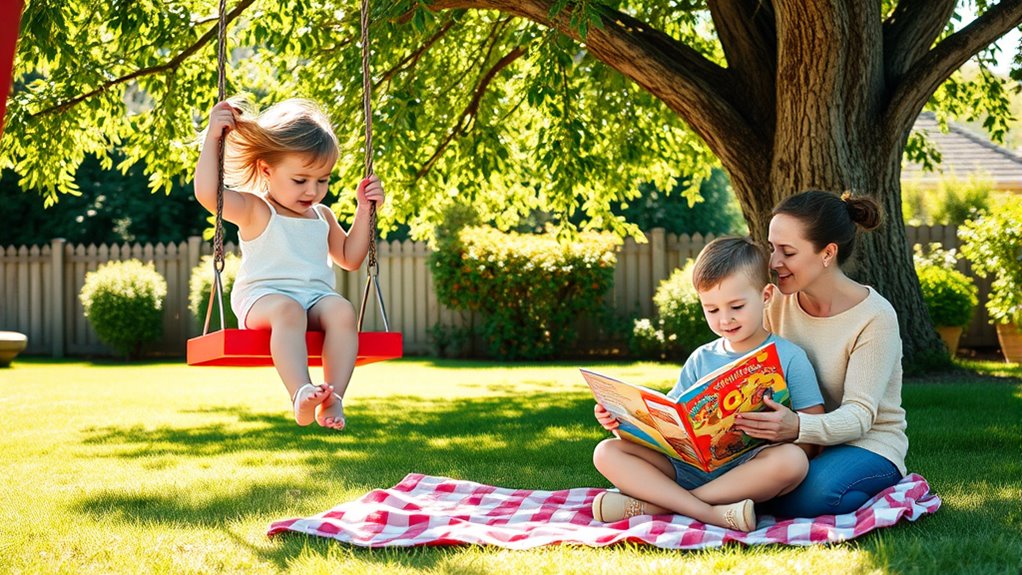
Providing individual attention to each child is essential in fostering a harmonious family environment and reducing sibling rivalry. When you focus on each child, you address their need for attention, which can greatly reduce jealousy and resentment.
Set aside specific times each day for one-on-one interactions, engaging in activities that reflect their interests. This personalized approach not only boosts their confidence but also prevents negative behaviors stemming from feelings of neglect.
Encourage meaningful conversations to strengthen your bond and actively listen to their thoughts and feelings. By ensuring that each child feels valued, you promote emotional intelligence and reduce competition among siblings, paving the way for a more cooperative and loving family dynamic.
Teaching Conflict Resolution Techniques for Lasting Harmony
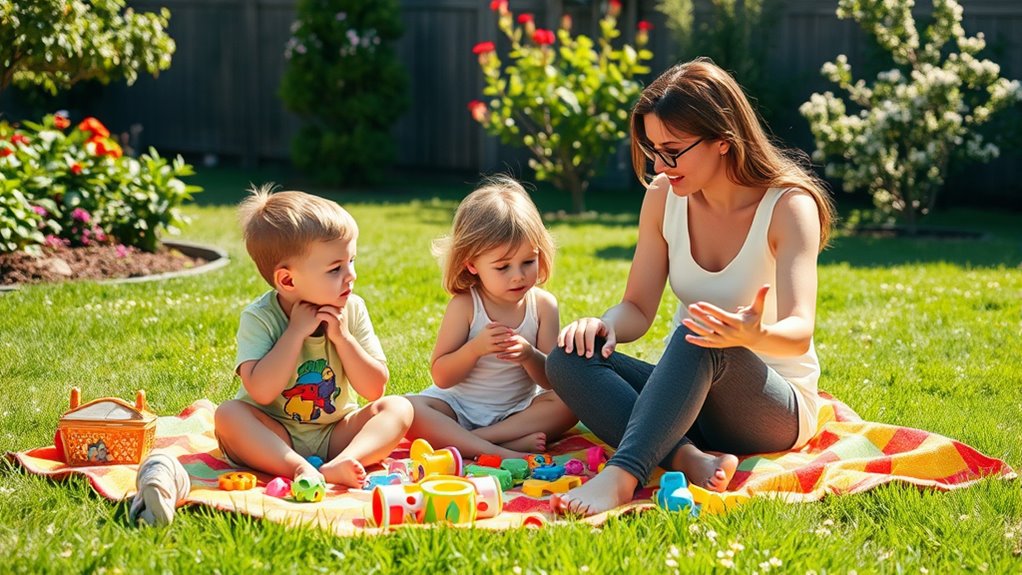
While sibling rivalry is a common challenge, teaching conflict resolution techniques can pave the way for lasting harmony in your family.
Start by modeling calmness and fairness during conflicts, showing your kids how to communicate respectfully. Encourage them to express feelings using “I” statements and practice active listening to understand each other’s perspectives. Remember that processing loss can be a vital part of understanding their emotions.
Guide them in identifying issues and brainstorming solutions together, promoting independence in resolving conflicts. Use role-playing to strengthen these skills. Incorporating emotional intelligence into your teaching can also enhance their understanding of each other’s feelings.
Foster positive interactions through shared activities and praise their cooperation. Finally, remain neutral during disputes, validating both sides’ feelings and guiding them toward mutual solutions.
These techniques will empower your children to navigate conflicts effectively, leading to a more harmonious home. Additionally, teaching emotional regulation skills can enhance their ability to manage emotions during disputes.
Frequently Asked Questions
How Can I Recognize Signs of Sibling Rivalry in My Children?
You can recognize signs of sibling rivalry by watching for constant arguing over minor issues, like toys or seating.
Listen for complaints or tattling aimed at gaining your attention.
Notice if they engage in verbal competitions or show dissatisfaction during interactions.
Look for physical conflicts, like pushing or grabbing toys, and any emotional signs, such as sulking or acting out to capture your attention.
These behaviors can indicate underlying rivalry between your children.
What Age Gaps Are Ideal to Minimize Sibling Rivalry?
To minimize sibling rivalry, consider age gaps of 3-4 years or larger.
With this distance, older siblings often take on nurturing roles, reducing competition for attention and resources.
Research suggests that a gap of about 27-32 months strikes a balance, allowing for companionship without intense rivalry.
This setup typically fosters better academic performance and social skills, creating a more harmonious family environment.
Are There Specific Summer Activities That Reduce Sibling Competition?
Summer’s sizzling sun sets the stage for shared sibling success. Engage in exciting outdoor escapades like swimming or biking, promoting cooperation over competition.
Crafty collaborations in arts and crafts can spark creativity and conversation. Family movie nights create a cozy connection without pressure, while scheduled playdates diversify dynamics.
How Can I Encourage Siblings to Support Each Other’s Interests?
To encourage siblings to support each other’s interests, start by establishing ground rules that promote respect and appreciation.
Engage them in shared activities, like collaborative projects, to foster teamwork.
Celebrate each child’s achievements, big or small, to build a supportive atmosphere.
Nurture their individual passions while helping them recognize the strengths in one another.
Regularly discuss their interests, encouraging open communication and active listening to deepen their connection and understanding.
What Role Do Parents Play in Mediating Sibling Disputes?
Parents play an essential role in mediating sibling disputes by facilitating open communication. You should actively listen to both sides and encourage your children to express their feelings.
Establishing ground rules for respectful dialogue can help. Additionally, teaching conflict resolution skills empowers them to find their own solutions.
Conclusion
Maneuvering sibling rivalry during the summer can feel like juggling flaming torches, but with the right strategies, you can turn chaos into harmony. By understanding your kids’ needs and fostering teamwork, you’ll help them bond and create lasting memories. Remember, it’s all about balance—give each child individual attention while promoting positive communication. With these tools in your parenting toolbox, you’ll not only manage conflicts but also nurture a loving sibling relationship that stands the test of time.









